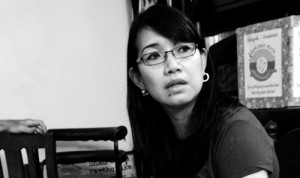‘It has been too long for us already—way too long’
By The Best Friend • June 5, 2011 Khin Ohmar has pledged over 23 years of her life to the fight for democracy in Burma. As a leading student figure in the 1988 anti-military uprising, she was forced to flee Burma to seek refuge in Thailand. Since completing university in the U.S., she has gained considerable experience in international and regional advocacy, working with the Women’s League of Burma, the Burmese Women’s Union, and now Burma Partnership.
Khin Ohmar has pledged over 23 years of her life to the fight for democracy in Burma. As a leading student figure in the 1988 anti-military uprising, she was forced to flee Burma to seek refuge in Thailand. Since completing university in the U.S., she has gained considerable experience in international and regional advocacy, working with the Women’s League of Burma, the Burmese Women’s Union, and now Burma Partnership.
Her profound experiences have not changed her warm demeanor. She remains humble and open, and generously devotes her time to Burma’s cause in any way she can – whether at prominent ASEAN summits or in spontaneous intimate gatherings at The Best Friend Library in Chiang Mai.
At a special event on 2 June, Ohmar addressed a group of fellow activists and volunteers in Chiang Mai, embracing the event as another opportunity to spread awareness about developments in Burma’s struggle.
Despite what some consider recent positive developments in Burma – the election of a so-called civilian government, the recent ‘amnesty’ for over 14,000 prisoners – “In reality,” she said, “we still have an authoritarian dictatorship, and many things are moving in an even more worrying direction.”
The country’s new constitution has only aided the ease with which Burma’s military maintains total control over its people. It has ensured the continuance of their dominion over natural resources, and disregards the rights of the ethnic minorities. Land confiscation has risen dramatically, Ohmar said, as private “crony” companies have recently been allowed to join the military in seizing land from citizens.
Other alarming developments in Burma since the 2010 election – an election, she pointed out, that was roundly condemned as a fundamentally flawed practice lacking credibility – include the increase in environmentally-destructive mega-development projects, and new influxes of refugees from Burma’s ethnic areas into Thailand.
Ohmar also spoke about Burma’s request to be the ASEAN chair in 2014. The country’s turn for chairmanship is set for 2016, but the Burmese government has asked to have it moved forward, suspiciously a year before Burma’s next elections in 2015. Burma’s government hopes being announced as ASEAN’s chair will lend it a sorely needed level of legitimacy internationally.
Ohmar said these examples highlight that the struggle in Burma is far from over, but should incite Burmese and global activists to continually mobilize in their quest for change.
Additionally, Ohmar sees reason for hope in the unyielding resilience of monk and student movements within Burma.
“Something good has happened – people have started to mobilize, started to help each other, whether it’s by teaching, delivering food and water, or operating free funeral services. There is a real spirit of empowerment and defiance.”
As the coordinator of Burma Partnership, a network of organizations that collaboratively advocate for democracy and human rights in Burma, Ohmar and her affiliates are pushing for the establishment of a Commission of Inquiry by the United Nations. The commission would call for a thorough and critical investigation into human rights violations committed by the Burmese military, including sexual violence, the extensive use of child soldiers, forced labor, torture, detention, and extrajudicial killings – and set the stage for victims to be able to seek justice.
So far, Ohmar said, 16 prominent nations have supported the call for the Commission of Inquiry, but in order for it to it to become a reality, citizens need to continue to pressure their governments on the issue. She is currently lobbying for the support of Indonesia and the Philippines as strong fellow members of the ASEAN community, as well as encouraging foreigners to write letters to their foreign ministries and embassies, urging that the plight in Burma finally be properly addressed by the U.N.
“It has been too long for us already—way too long. We need to use international mechanisms to end the crimes and get justice.”
In the past 20 years, over 40 resolutions ‘expressing concern’ about the situation in Burma have been passed in the U.N., but there have been no firm commitments for action.
Ohmar is full of hope for the potential that the situation will finally be addressed by a global body, and spoke to how empowering it is for individuals working inside Burma for the cause, especially the courageous younger generation.
“The younger generation in Burma has become very active and aware because of information technology and social networking between the inside and the outside,” she said. “This is encouraging.”
Tags: Commission of Inquiry, Khin Ohmar, The Best FriendThis post is in: Blog
Related PostsCall for Probe Into Military Junta’s Crimes Against the Media
Human Rights Council Highlights International Law Violations in Burma
BROUK Appeal to World Body to Put Pressure on President Thein Sein’s Rohingya Ethnic Cleansing Proposal
Clinton’s Historic Trip to Burma Highlights Need for Continued Sanctions
ASEAN: Set Benchmarks for Burma on Rights









 All posts
All posts